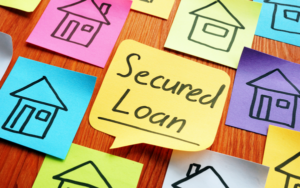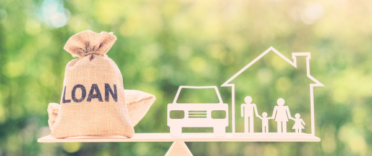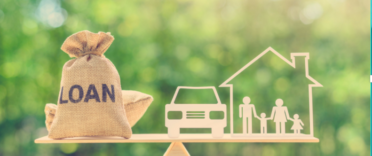
Secured loans are different to unsecured loans because the borrower is required to put up an asset as security. You will still need to repay the money you borrow – plus interest – in monthly instalments, but with the added risk of losing something valuable if you cannot pay. However, you could borrow much more money with a secured loan, access a lower rate of interest and pay the cash back over a longer period.
In this article, we run through how secured loans work, the advantages and disadvantages of secured loans, plus the alternatives of a secured loan to help you get a better handle on your borrowing options.
Go to our 'The best secured loans & the rates in the UK' page to compare secured loans.
What is a secured loan?
A secured loan – also called a homeowner loan – is a way of borrowing money using a valuable asset as security. The loan provider lends the money on the basis that if the borrower does not repay the cash, the asset can be sold to settle the debt. This means that taking out a secured loan could put a valuable asset you own – such as your home – at risk.
The amount of money you are lent will be based significantly on the value of the asset you put up as collateral, however, your financial circumstances and credit history are also important. Your creditor will need to be confident that you can afford to meet the monthly repayments of the loan through your regular income, as repossession is a final resort.
The differences between secured and unsecured loans
These are the important differences between a secured and an unsecured loan to be aware of:
| Secured loan | Unsecured loan |
| Asset (usually a property you own) required as security | No asset required as security (which means you don't need to be a homeowner) |
| High maximum loans (depending on the value of the security) | Limited maximum loans |
| Your home (or anything else that was used as security) could be repossessed if you fail to repay the debt | Your home will not be directly at risk if you default on the loan |
| Long loan terms available | Only shorter loan terms available (up to 10 years) |
| Variable interest rates mean monthly payments can change | Usually a fixed rate of interest, which means monthly payments stay the same |
| How much the security is worth is generally more important than the applicant's credit score | A good credit score is essential to access the top rates |
| The application process and approval can take a long time | Approval and payment can be very quick |
| Potential for expensive set-up fees | Can often be set up fee-free |
How does a secured loan work?
A borrower will need a valuable asset to use as collateral in order to take out a secured loan. In most cases, this is a property but in theory, it could be any item of value. Borrowing money against your home will require you to have a certain level of equity in the property. Having a valuable house is not enough if you do not have a significant share of the equity.
The lender will perform an affordability check to make sure the borrower has a large enough regular income to comfortably afford the loan repayments. Financial circumstances and credit histories are less important with secured loans than unsecured loans, but they are still relevant.
Once approved and paid, the borrower will need to begin paying the money back through monthly instalments. Taking out a secured loan means that you will have to repay what you borrow (the capital) plus interest. Interest rates are usually lower than with unsecured loans, but what you pay will depend on the value of your asset, the length of the loan period, your credit history and your financial circumstances.
What happens if you miss a secured loan repayment?
Missed repayments on a secured loan can put your asset at risk. However, you will not immediately have your house repossessed if you miss one payment. There is a process that lenders will follow to reclaim money from borrowers at risk of defaulting.
One or two missed payments could lead to a lender sending a notice of arrears, while four to six missed payments can mean you receive a default notice. You will be charged administration fees for any letters sent, which will be added to your debt. A default notice will usually give you two weeks to clear any outstanding arrears. If you cannot do that, a default could be registered on your credit report and you will need to repay the loan immediately. Your lender could then take you to court if you fail to pay at that stage. The court could order the collateral asset to be sold to settle the debt.
Thankfully, there are many steps that you can take to avoid reaching this point. The first is to contact the lender. It is often more profitable for loan providers to ensure the debt is repaid through monthly instalments than through repossession, so you may find your lender is happy to adapt your payment schedule to make repayments more manageable.
You can also reach out to a number of free debt charities. These organisations can offer essential advice and guide you through repaying your debt. Read our article ‘Where to get free debt advice’ to find out more.
What can you buy with secured debt?
A secured loan is probably best suited for expensive projects like home improvements. This could involve building an extension, replacing a kitchen or converting your loft. Big renovations are often very costly, which means that you may not be able to borrow enough money with an unsecured loan. If you can borrow enough money with an unsecured loan, the level of interest you have to pay could make the project too expensive. Therefore a secured loan could offer you the right level of borrowing at an affordable rate of interest.
As well as home improvements, you could use a secured loan to finance essential repairs. This might be replacing a broken heating system or fixing a leaking roof. Any damage to your home can quickly spiral, so taking out a secured loan could be a useful way of fixing issues quickly, rather than taking time to save up the cash.
Secured loans can also be used to consolidate existing debt. Taking out a secured loan is often cheaper than other kinds of borrowing. This means that you could use a secured loan to pay off more expensive unsecured debt or simplify multiple monthly repayments into one. Read more about debt consolidation in our article ‘What is the best way to consolidate my debt?’.
It is important to remember that all secured borrowing comes with the risk of losing the asset you are putting up as collateral. You should think carefully before you use your home as security.
As part of the application process, borrowers are likely to be asked how they want to spend the money they are being lent. You should always be honest about why you are applying, as your lender may not approve loans for certain types of spending.
How much does a secured loan cost?
The cost of your secured loan will depend on five major factors.
- The interest rate: The APR (annual percentage rate) you are offered by the lender will dictate how much interest you will pay per year on your debt. The APR figure will include arrangement fees, but not other charges.
- How much you are borrowing: Your APR will usually be higher if you are borrowing less money. However, it is important to always only borrow the amount you need.
- Your borrowing period: The longer you take to repay your loan, the more time there will be for the interest to compound and grow. This means that you will end up paying more for your loan overall. However, the loan period will need to be long enough for you to spread the debt into affordable monthly repayments.
- Your credit history: You will usually be offered a lower rate of interest if you have a good history of repaying any debts on time and in full.
- The value of your secure asset: If this is your home, your level of equity will be just as important as the value of the property.
Your loan may cost more than what is advertised by the lender. Loan providers advertise a representative APR that must be offered to over half of successful applicants. The rest will be offered a different rate. Borrowers with a poor credit history will likely be offered more than the representative APR. Request a quote from your lender before you complete your application to make sure you have the right figures.
Keep in mind that some secured loans will have a variable rate. This means that the rate of interest you start on will not necessarily last for the duration of the loan term.
How much can you borrow with a secured loan?
Secured loans often include a higher borrowing limit than unsecured loans. Lenders are willing to offer more because they have the added security of being able to repossess a valuable asset if the borrower cannot repay their debt.
Exactly how much any individual can borrow will vary depending on financial circumstances, credit history, the value of the collateral and the lender's own policy. Generally, borrowers will be able to access between £3,000 and £500,000 through a secured loan. Some specialist lenders may be able to offer lower or much higher amounts.
You should think about how much you will be able to afford to repay each month before you apply for a secured loan. The lender will also have to take this into account when assessing your application.
Pros and cons of secured loans
A secured loan could help you pay for a big expense or consolidate any existing debt. However, it will not be the right option for every scenario and every borrower. Here are the main pros and cons of secured loans.
| Pros of secured loans | Cons of secured loans |
| Borrow large amounts - Borrowers can generally access more money through a secured loan than an unsecured loan. | Your secured asset will be at risk - Your asset could be repossessed if you fail to make your repayments. |
| Lower interest rate - You are likely to be offered a lower interest rate than through an equivalent unsecured loan or a credit card. | Fees and charges - You may have to pay arrangement fees and early repayment charges. |
| Credit history less important - Your credit history will be less crucial to the application process – though still important – as you will be putting up an asset as collateral. | More interest overall - The longer repayment term of a secured loan could mean you pay more interest overall than with an unsecured loan, though this depends on the particulars of your deal. |
| Longer repayment terms - Many lenders will offer longer repayment terms than with an unsecured loan. | Variable rates - Many secured loans come with a variable rate of interest. This means that the cost of your loan could go up during your repayment period. |
Alternatives to secured loans
Two of the main alternatives to a secured loan are an unsecured loan and a credit card.
Secured loans vs unsecured loans
Unsecured loans – also called personal loans or unsecured personal loans – are a type of borrowing that does not require collateral. You may not be able to borrow as much as with a secured loan and the interest rate could be higher, but there is usually less risk. You can read more about unsecured loans in our article ‘What is an unsecured loan?’.
We also weigh up the differences in our article ‘Secured vs unsecured loans: Which is best for me?’
Secured loans vs credit cards
Credit cards involve paying back money over a period of time with interest, just like a loan. However, credit cards are generally more suited to everyday spending with occasional big expenses. A credit card will likely be a better option than a secured loan if you are planning on borrowing a small amount for a short period of time.
You can find out more about the difference between credit cards and loans by reading our article ‘Is it better to get a credit card or a personal loan?’.
You can use Money to the Masses partner Creditec* to quickly build a list of the credit cards that match up with your needs. By simply adding in a few basic details, you will get a tailored collection of the best credit cards for you. You can use your Creditec results to check how likely you are to be accepted for a certain card, which cards available to you offer the best rewards or find out what option will leave you with the lowest fees to pay. Creditec is able to check your eligibility without running a full credit check, which means your credit score will not be affected. Click this link to start your comparison*.
If a link has an * beside it this means that it is an affiliated link. If you go via the link Money to the Masses may receive a small fee which helps keep Money to the Masses free to use. But as you can clearly see this has in no way influenced this independent and balanced review of the product.



